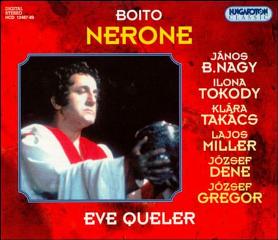Arrigo Boito – Nerone (Eve Queler) [1982]
Arrigo Boito – Nerone (Eve Queler) [1982]

CD1 1. The Appian Way: Canto D'amore 2. The Appian Way: Ti Copra L'altro Vei 3. The Appian Way: Sei Colta 4. The Appian Way: Padre Nostro 5. The Appian Way: Fanuel! 6. The Appian Way: Poiche Un Periglio 7. The Appian Way: Nessun Ci Segue? 8. The Temple Of Simon Magus: Stupor! Portento! 9. The Temple Of Simon Magus: Su Quell'altar 10. The Temple Of Simon Magus: Sparisci 11. The Temple Of Simon Magus: Spiato Son La CD2 1. The Orchard: El Verdendo Le Turbe 2. The Orchard: Viene Il Signore 3. The Orchard: Di Pace... Una Dolente 4. The Orchard: Fanuel!... Fanuel! 5. The Orchard: Va Guardingo 6. The Orchard: Furar Tentai 7. The Circus Maximus: Part I. The Oppidum: Vittoria! 8. The Circus Maximus: Part I. The Oppidum: Che Vuoi Dir 9. The Circus Maximus: Part I. The Oppidum: Cio Ch'io Struggo 10. The Circus Maximus: Part I. The Oppidum: Chi, La Dov'io 11. The Circus Maximus: Part I. The Oppidum: E Tu Non Voli? 12. The Circus Maximus: Part II. The Spoliarium: Scendi 13. The Circus Maximus: Part II. The Spoliarium: Ah!/Non Temer Nero - János B Nagy Simon Mago - József Dene Fanuel - Lajos Miller Asteria - Ilona Tokody Rubria - Klára Takács Tigellino - József Gregor Gobrias - Péter Korcsmáros Dositeo - Pál Kovács Perside - Mária Takács Cerinto - Tamara Takács Hungarian Radio & TV Chorus Hungarian State Opera Orchestra Eve Queler – conductor
Nerone (Nero) is an opera in four acts composed by Arrigo Boito, to a libretto in Italian written by the composer. The work is a series of scenes from Imperial Rome at the time of Emperor Nero depicting tensions between the Imperial religion and Christianity, and ends with the Great Fire of Rome. Boito died in 1918 before finishing the work.
It was eventually premiered posthumously at La Scala on May 1, 1924, conducted by Arturo Toscanini in a version of the score completed by Toscanini, Vincenzo Tommasini, and Antonio Smareglia. The role of Nero was first performed by Aureliano Pertile. The role of Asteria, a young woman torn between her love for Nero and her Christian sympathies, was created by Rosa Raisa.
The opera was very well received at its premiere, and the newly rebuilt Rome Opera House inaugurated its first season with Nerone in 1928. However, it has only been rarely performed since that time, even in Italy. It did not receive its US premiere until April 12, 1982, when it was performed in a concert version by the Opera Orchestra of New York in Carnegie Hall. ---wikipedia
Arrigo Boito (1842-1918) struggled with "Nerone" over parts of five decades. He never finished it. He conceived the opera in true Grand Opera fashion with five acts. For the fifth act, only a few vague musical sketches were found, not enough for any posthumous reconstruction of what Boito had in mind. For the rest of the opera, Boito left enough for Toscanini to commission two composers, Tommasini and Smareglia, to cobble together the four act version that appears on this set. Toscanini conducted the premiere of this "Nerone" at La Scala in 1924.
Although this opera is called "Nerone," it pretty much starts with Simon Magus, is driven by his plots and schemes, and ends not long after his death. Nero, by comparison, is a subordinate character. I suppose that Boito's intended five act version might have devoted much of the last act to the demented emperor and thus justified the opera's title. As it stands now, the piece should be called "Simon Mago."
Overall, the music of "Nerone" exhibits a high level of competence. On the other hand, after listening to the opera a couple of times and to some parts of it more than that, I am at a loss to identify any highpoints. Throughout "Nerone" I found myself being reminded of those overblown, wide-screen, Hollywood epics set in imperial Rome: "The Robe," "Ben Hur" and the others of that ilk. There is nothing in "Nerone" that manages to match even the lackluster impact of "Polliuto," an opera of similar setting that was very much the run of Donizetti's mill.
I regard the performance as basically sound. There is a certain lack of energy, but I attribute that more to the composer than the performers. Giangiacomo Guelfi is the only member of the cast that I would place among the top rank of singers, but he is joined by the ever-reliable comprimario Piero de Palma and a solid group of B-list performers, right across the board. I'd be perfectly happy to attend a performance with this cast at any opera house today.
This is an opera and a recording for the more serious fan and dedicated collector. For that kind of person, I give this "Nerone" four stars rather than the much lower rating I'd otherwise slap on it. --- L. E. Cantrell, amazon.com
download: uploaded anonfiles mega 4shared mixturecloud yandex








